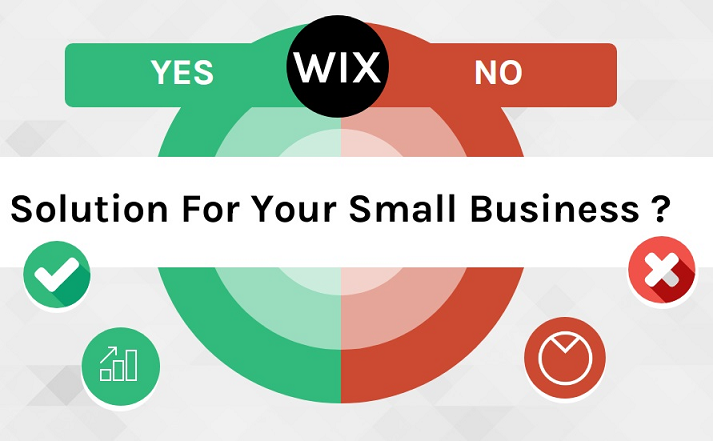With over 200 million users around the world, WIX seems to be the next best thing in website building! With many small businesses owners opting for this new drag and drop website creator, is it really all that it claims to be? Some swear by its ease of use and functionality, but others seem to be swearing at it rather than by it.
If you are a small business owner, looking at developing your website and are considering WIX for your website development project, we here at Discovery Content urge you to reconsider.
We’re going to give it to you straight; we’re not huge fans of WIX. If you’re a die-hard fan, look away now, you may not like what’s coming. But if you’re looking for an honest review that explains why WIX may not be the right choice for small business keep reading.
WIX is Inconvenient for SEO Optimisation
As experts in the world of SEO, our opinion and experience is that WIX is just not convenient for SEO optimisation! Sure there have been recent updates, and there have been improvements in some of their features, but overall and overwhelmingly, WIX does not cater to SEO ease. If you’re a small business owner, who does not have a lot of time and experience with SEO optimisation, WIX will not make this process any easier, in fact, it will make life more difficult!
The simple fact is, if people can’t find you on Google, then your business is as good as ‘not existent’ in the online world. How do you become ‘existent’ is through various online activities, one of the major ones being SEO optimisation. You’re putting your services online, creating a website for the purpose of driving in new business and reaching new (and old) customers, if there is no visibility then there can be no leads.
Back to the ease of functionality with SEO, it is astounding that a company as large as WIX (remember they service more than 200 million users) still doesn’t have SEO optimisation down packed (despite the 2019 update). In short, some of the issues that present with SEO implementation include:
- Poor onpage optimisation
- No accessibility to sitemap (even though its automatically created)
- Tablet version of the website is not customisable
- Appalling speed time (how quickly pages load)
- The page builder creates unnecessary code blots extra codes = extra weight = slowing the website down
If you are a small business owner, a lot of the above is gibberish to you, however the above points out some basic and fundamental elements of SEO optimisation that allow websites to be visible on search engines.
Even if you will not be doing the optimisation yourself, it is important that you know that your developers might have issues with implementing some key elements that are important to website optimisation.
WIX Website Speed
As noted above, one of the major downfalls of WIX is their website loading speed, or lack thereof (speed). As one of (many) ranking factors, speed has been a major factor in website development. There are many live WIX sites that take several seconds to load, which in today’s time, is a lifetime. People just don’t have the patience and/or want to wait for websites to load. Think about it (from a user perspective) if a website is not loading automatically, are you going to wait around for it to load or are you going to move on? More often than not, the answer will be to move on.
An additional factor to take into consideration is that slow websites are not just annoying, but lead to demonstrable drops in conversions. Several studies have been conducted into page speed loading, in one such study it was noted that when the average load time was over 4.2 seconds (yes seconds) that the conversion dropped below 1%, for small business, that is no small percentage. So in short, speed is very very important.
WIX is Difficult to Use
The people who praise WIX , more than likely have spent many hours perfecting it’s navigation, however, for first time users, the navigation and working out how to best ‘edit’ your site, is painstaking. It’s not rocket science needless to say, but it is a fair statement to say that WIX is far more difficult to use than platforms such as WordPress and/or SquareSpace for example.
In general, the interface is clunky and is overwhelming for people who don’t really work with websites (strangely, their very target market), and is not something that you can easily learn. Let’s face it, as a small business owner you don’t want to be spending hours learning how to create a website, that’s not your speciality, your speciality is your business, ney your industry, products and services and any free time you have should be spent on this and/or your family and friends rather than perfecting website creation or development.
To make it clear WordPress and SquareSpace is no walk in the park either, but WIX is arguably more difficult. For your convenience and time, you need to consider what will be less time consuming.
Until WIX simplifies their editor and introduces more user friendly editorial options, it would be easier to create, edit and upkeep your website on WordPress or SquareSpace. Sure, there are learning curves with all website platforms, but they are more flexible and allow the user to have more control of what you publish.

Who Really Owns Your WIX Website?
This might be the WIX’s biggest downfall and number one reason to consider platforms and it relates to website ownership. More often than not, we tend to just click ‘next’ when installing new apps and programmes. Even more so when creating a website, we have an element of trust that a company will not take advantage of us. Sure, you might get the ad or two popping up, and might be kicking yourself for not reading all the information in the box before clicking ‘next’, but we sure do not expect that by clicking ‘next’ we give ownership of our website, and this is exactly what happens with WIX. In laymans, if you create a website with WIX they own it! No ifs or buts about it, they own it! You are merely signing up/paying (check the rates closely, it may not be as cheap as you think) for a subscription fee to their platform (more or less).
Even if you have your own domain name to run your site from, the nuts and bolts belong to WIX. This essentially means that you’re entirely dependent on them for your online presence. That isn’t really a huge deal when it comes to the day to day, but imagine if they decide to significantly raise their prices or they go bankrupt or worse still they decide to take down the entire platform, what will happen to your site and all the work you’ve put in over the months/years? Basically it would leave you at the mercy of WIX, whatever they decide to do next (new platform, raise the prices, change themes, cut out options) you either need to follow suit or say goodbye to your website and start from scratch.
Why Do People Use WIX?
If WIX really is this inconvenient for use, why do people still use it? How is it that they are servicing millions of people and businesses around the world? In short, good advertising.
In saying this (and all the above) there are features that are rather appealing in WIX, like:
- Drag and drop options
- Integrates well with secure payments (important for Ecommerce customers)
- Provides mobile responsive templates
- Has integrated analytics and reporting tools
- Has over 800 themes to choose from
- WIX app market
- WIX ADI (Artificial Design Intelligence)
Although the above are just a fragment of WIX’s selling points, and top features, the ease of use and control over the website (or the lack of) is their biggest downfall and something to continually keep in the back of your mind.

The conclusion may already seem obvious, but here it is in a nutshell; WIX isn’t a bad product, far from it, but there are others out there that will probably be a better fit for small business owners who don’t have time to learn the ins and outs of website development and SEO optimisation.
The platform you choose should be based on careful consideration taking into account; your business requirements, budget, help available (online/offline), website design, website ownership. For most small business owners, WordPress is likely to be your best bet and a close second, is SquareSpace. They are both user-friendly and cater to a wide range of technical needs, they allow you to own your website and cater for SEO hacks, which for online presence, is vital. For small business owners with a slightly higher budget consider Drupal as an alternative to WIX.
Our advice? Take your platform for a ‘test drive’ and read carefully what they are offering. There are plenty of plug and play themes that you can have up and running (not just in WIX) in no time. See what feels comfortable and go with it.

